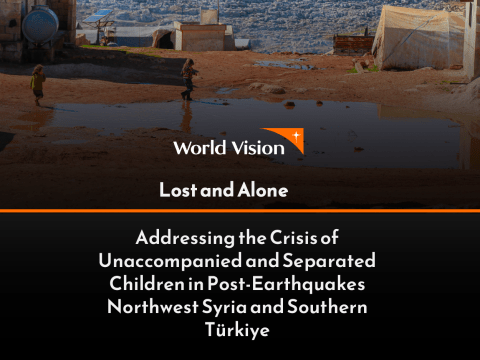Revealing the Hidden Crisis: World Vision's New Report Highlights the Struggles of Unaccompanied and Separated Children in Post-Earthquake Northwest Syria and Southern Türkiye

Amman, August 19, 2024 – A new report from World Vision reveals the profound impact of 2023 earthquakes on unaccompanied and separated children in Northwest Syria and Southern Türkiye. The comprehensive study reveals critical gaps in data and services that exacerbate the vulnerabilities of these children.
Key findings from the report:
- A significant surge in the number of unaccompanied and separated children was observed, with many lost parental care directly as a result of the earthquakes.
- Additional drivers of increased family separations post-earthquakes include homelessness, socio-economic hardships, and cultural factors such as divorce and remarriage of the caregiver.
- Critical lack of detailed data on unaccompanied and separated children, including their gender, disability, and refugee status, making these children largely invisible both as a group and in their diversity.
- Unaccompanied and separated children are increasingly vulnerable to child labor, child marriage, and severe mental health challenges, exacerbated by inadequate protective measures and significant gaps in available services.
- Kinship carers receive no state assistance, and humanitarian responses frequently fall short in providing adequate support, including essential services for these children.
- This shortfall in support has led to an increase in unregulated residential care, unsupervised living situations, and child-headed households, which expose these children to increased protection risks.
- Family-based care, particularly kinship care, remains the primary form of alternative care in both regions. Despite its critical role, this care model receives minimal recognition and support, which adversely affects its sustainability and effectiveness.
- Persistent challenges in tracking child protection funding, especially for unaccompanied and separated children, are exacerbated by its categorization under the broader "protection" sector.
Highlighting the human side of our study, here are heartfelt narratives from the children who have lived through these hardships:
- an 8-12-year-old girl in Idleb, shared: "Before the earthquakes, I was worried about power outages and lack of food. Now, I fear building collapses and losing my grandparents who care for me."
- a 13-17-year-old boy in Gaziantep, shared: "I worked in many jobs, like factories and workshops, to secure a livelihood for me and my siblings. I could not continue my studies fully, and my work experience was horrible. I worked long hours as a worker, but the pay was half that of an adult.”
- an 8-12-year-old boy in Hatay, shared: "Some children have started working in collecting scrap metal from where the building debris is dumped. These kids go every day to gather iron, copper, and aluminium."
- a 13-17-year-old girl in Gaziantep, shared: "Fear has become my companion. I'm afraid of any movement or sound. I'm afraid of losing my new loved ones, my neighbors, and my friends, and my new school, after I tried hard to fit in a new place where I don't belong and alone without my mom and dad."
World Vision calls for urgent actions, including:
- Improving the collection and sharing of data on unaccompanied and separated children, emphasizing their diversity and the various informal and formal alternative care systems, particularly those that are community-based.
- Prioritizing the prevention of family separation during emergencies, and enhancing support for family reunification.
- Boosting support for parents, families, and caregivers through financial and in-kind contributions, as well as providing mental health support, to foster a nurturing and stable environment for children and prevent family separation.
- Enhancing unaccompanied and separated children’s access to quality, equitable, and specific essential services, especially mental health and psychosocial support, child protection, and education.
- Strengthening the skills and capacity of the child protection workforce in key areas of unaccompanied and separated children programming, such as prevention of separation, case management, family tracing, reunification, and fostering cross-sectoral coordination for holistic prevention and response strategies.
- Ensuring the meaningful participation of unaccompanied and separated children, caregivers, and community members in the planning and implementation of policies and programmes.
Emmanuel Isch, Director of World Vision Syria Response has stated “Our report integrates insights from a broad spectrum of contributors – including caregivers, community members, and vitally, the Syrian unaccompanied and separated children themselves, who are among the hardest hit by the earthquakes. This comprehensive perspective underscores the urgency of our call to action for policymakers and humanitarian agencies. We must prioritize and effectively respond to the profound needs of these vulnerable children, ensuring that they are at the forefront of humanitarian efforts in the Syrian conflict.”
The full report, "Lost and Alone: Addressing the Crisis of Unaccompanied and Separated Children in Post-Earthquakes Northwest Syria and Southern Türkiye," is available for download through the following link
ENDS
Notes to editor
For more information, please contact: Balquees Bsharat, World Vision Syria Response Advocacy Advisor, Email: balquees_bsharat@wvi.org
World Vision is a global humanitarian organisation dedicated to working with children, families and their communities to reach their full potential by tackling the root causes of poverty and injustice. World Vision serves all people, regardless of religion, race, ethnicity or gender.
For more information, please visit https://www.wvi.org/syria-response or follow us on X @WorldVisionSR.
World Vision Syria Response has been operating inside Syria, Jordan and Türkiye since 2011, where we provide life-saving protection, education, WASH, livelihoods and health services to refugees and local communities.